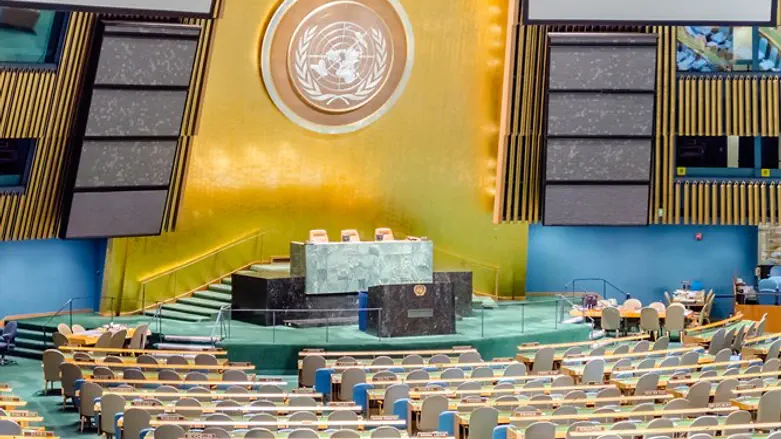
Manfred Gerstenfeld interviews Yohanan Manor, who coordinated the campaign to revoke the infamous "Zionism is Racism" UN Resolution.
“In these days of many vile attacks on Israel, it is worthwhile to recall the 1975 United Nation’s General Assembly resolution that ‘Zionism is Racism.’ That is probably the earliest major delegitimization project of Israel. It was invented by the Soviet Union to justify its refusal to condemn antisemitism during the negotiation of the International Convention on the Elimination of All Forms of Racial Discrimination in the mid-1960s.
“The Soviet Union and the PLO developed a plan to bring about Israel’s expulsion from the United Nations, with the PLO taking its place. When that failed, there was eagerness to advance a substitute: the condemnation of Zionism as racism. This was formally achieved first within the framework of the Third Committee of the General Assembly on 16 October 1975, and then on 10 November 1975 by the GA plenary with Resolution 3379 (XXX), which ‘Determines that Zionism is a form of racism and racial discrimination.’ The Soviet-Arab coalition won by 72-35 with two abstentions.”
Dr. Yohanan Manor is a co-founder of IMPACT-SE and was its Board Chairman from 2005 to 2011. His Ph.D. thesis deals with "Palestine in the Foreign Policy of Gamal Abd El Nasser." He was a lecturer at the Hebrew University of Jerusalem's Political Science Department (1970-1984) and coordinator of the campaign (1984-1991) that brought about the revocation of the UN General Assembly resolution equating Zionism with racism.

“It is likely that a resolute and coordinated effort by the United States, Canada, Australia, Western Europe, and Latin American and African countries could have mustered the additional votes necessary to secure a postponement. But, this did not occur, probably, on the one hand, out of relief that the most ominous threat, Israel’s expulsion from the United Nations, had been foiled, and on the other, out of the inner conviction that this farfetched, aberrant, and shameful resolution could have no palpable weight and the UN would do its best to forget it.
“Not even Israeli or Jewish organizations attempted to act for the resolution’s revocation. Instead, the Israeli and Jewish world viewed it with disdain. This position, which was maintained for almost a decade, was itself sheer nonsense. They greatly underestimated its impact and the damage it caused all over the world, unrealistically expecting that it would fade away by dint of its sheer inanity.
“During 1976-1984 the ‘Zionism is racism’ resolution was reiterated time and again, sometimes by even larger majorities. After the resolution’s adoption, Zionism began to assume mythical proportions in international discourse as a global cause of most world problems. This trend was not confined to Arab-Muslim countries and the Third World; it also substantially penetrated Western circles, especially universities. For instance, in Britain in 1976 and 1977, eight student unions adopted ‘Zionism is racism’ resolutions, openly flouting previously held policies not to deal with the Middle East.
“Then the vilification of Zionism turned into a permanent feature of international life. Nevertheless, official Israel did not regard the huge and mounting damage inflicted as sufficient reason to openly fight the resolution and act to overturn it. The Israeli Foreign Ministry often used two arguments to justify this inertia: that initiating action would be counterproductive since the ‘automatic majority’ at the disposal of the Soviet Union and the Arab-Muslim states would result in reiterations; and that it was formally impossible to overturn a General Assembly resolution as there was no such precedent.
“A central body was needed to direct this struggle. It took the form of the Steering Committee against the Zionism Is Racism Resolution, set up jointly by the World Zionist Organization and the Israeli Foreign Ministry. It was crucial to seek to overcome the so-called automatic UN majority. The first aim was to prevent reiterations. Yet more important was to undermine the validity and legitimacy of the resolution.
“It would take another five years to overturn the ‘Zionism is racism’ resolution.” The repeal was finally achieved not only thanks to the end of the Cold War, but first and foremost because the United States took the lead in this endeavor. This active involvement resulted from unabated pressure on the administration by Congress and American Jewish organizations. The U.S. administration put this issue even higher on its agenda than it was on Israel’s.
“At the opening of the UN General Assembly in September 1991, U.S. President George H.W. Bush took an unprecedented step. He raised the issue of the repeal plainly and directly, without linking it to any other subject. From then on there was a massive U.S. investment in the repeal endeavor. Undoubtedly arm-twisting was used in the spirit of Senator Daniel Moynihan’s exhortations. President Bush gave ‘unprecedented instructions to all his ambassadors [to warn] countries that failure to vote for revoking the resolution could affect their ties with the US.’ Finally, the draft resolution for a repeal was sponsored by 86 member states, and passed by 111-25 with thirteen abstentions.
“Unfortunately and incompetently, the revocation of the resolution was not exploited for political and diplomatic advantage by Israel and its supporters. Perhaps the sole, tardy exception was the initiating of a research on the overturn, which was to become this author’s book ‘To Right a Wrong.’ It was donated to the libraries of more than 1,200 universities, mostly in the United States.”
Manor concludes: "It took Israel another few decades to understand that being proactive at the UN could be profitable for Israel and that the so-called automatic majority against it at the UN was largely an excuse for inertia. A good illustration of such a change was the November 2005 resolution adopted unanimously by the UN General Assembly at the initiative of Israel of a Holocaust Remembrance day and the outreach program annexed to it."